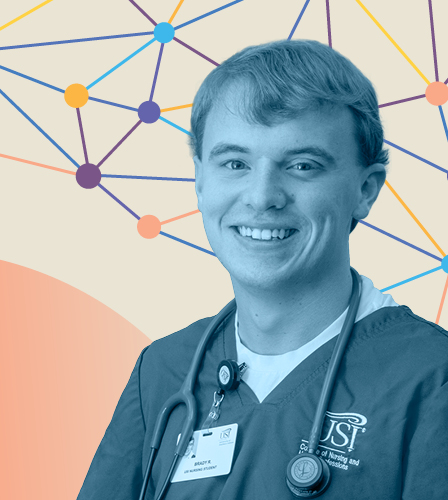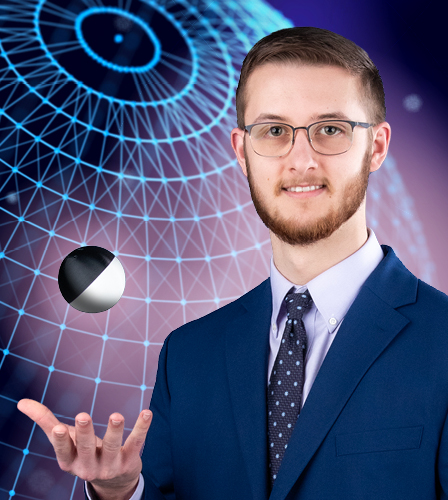Mountains to Climb: The Path Alice Walks
Alice Burris always intended to earn a college degree; it just took her 39 years to achieve what she started in 1984. But then, nothing in Alice's life went according to plan; at least, not her plan.
At 57 years old, Alice has faced some mountainous hurdles in life, beginning with an unexpected pregnancy during her first semester at USI when she was 18, then a diagnosis of multiple sclerosis (MS) when she was 36 and disabled by it at 41, followed by the sentencing of her oldest son to 38 years in prison. It was the last one that propelled her to return to USI in pursuit of a bachelor's degree in criminal justice with the goal of going on to law school so she can right some wrongs she sees in the penal system.
"I am a firm believer in God having a plan for me," she says. "It's not just about fixing the police or fixing the prosecution, it’s the system. It was never designed for people of color. We were not even considered people when the Constitution was written. There are too many wrongfully convicted people. That is what God has placed on me to work on."
Alice knows her son is not an angel. He has had his share of run-ins with the law that landed him in and out of jail and earned him a three-year sentence in prison. Her position has always been, you do the crime, you do the time. But in the case of her son's current incarceration, Alice does not believe he is guilty of the charges he was convicted of—possession of and dealing in methamphetamines.
The Word
There is a mirror in Alice's home office filled with affirmations. It is the source of her annual word-for-the-year selection; one word to guide her and be her touchstone through any challenges the year brings. As she gazed at the potential pronouncements early in January 2020, one kept rising up before her: Persevere.
Alice had been entertaining the idea of returning to USI for a college degree, and the word was a message to her. She filled out the application, telling no one her plans. A few weeks later, while attending a church conference in Florida, she learned she had been accepted as a returning student. "I was shocked, but I don’t know if it was because I got in or if I was OMG, what did I do?" she says.
Doubt plagued her. "I asked myself, 'Do I really want to devote four years to getting a degree?'" Her mind raced through all the reasons not to go back to school. She had MS and experienced relapses that upended life. Her grandson lived with her part of the week. She had not been a student in decades. "I knew, spiritually, that was the enemy giving me all the reasons why not to [go back for my degree]," she says. "I remember praying about it and God telling me he had work for me to do and I needed to get this done."
Then COVID-19 shut the world down and she wondered again if it was a sign. "I thought to myself, 'Lord, am I not supposed to go [to college]?'" she says. "But do you know what I got? Persevere."
To keep her on her educational and life course, Alice had "Persevere" imprinted on a bracelet she wore daily. That May, on Mother's Day, she wrote to her three children telling them since they were all grown and had families of their own, it was time for mom to do what mom needs to do, and she was going back to school. Their support was unwavering, especially that of her mother, whom Alice had always leaned on. "She was my biggest cheerleader," Alice says.
The Journey
Alice arrived on campus in August 2020, in the shadow of COVID-19 but with the zeal of every first-year student. "I was right there. I wanted to be all in. I’m a freshman and I’m going to act like a freshman," she says. "When I came back, my goal was to be a part of everything I could."
She quickly learned of USI's Emerging Leaders (EL) program which offers first-year students the opportunity to develop leadership skills, engage with and contribute to the USI community while creating new friendships. She applied and was accepted. Alice's contribution to the group came from years of job-related leadership experience, having spent 15 years in retail management positions for various clothing and merchandising store chains. Her last job, before MS prevented her from working, was as a branch manager for a bank.
Despite years of experience, Alice credits her 18-year-old peers in the program with teaching her. "I learned so much from the young people. Yes, I have children," she says, "but it is different talking to people outside of your family. Hearing their perspectives helped me become a better listener and leader."
The spring, semester-long program puts students into small clusters. The groups meet weekly to participate in workshops, listen to speakers and learn about leadership opportunities. At the end, each group selects a member to talk about their experience and Alice was elected to speak for her group. "I spoke on how much I learned from them and that we can always learn and hone our skills no matter our age, and to not be afraid to do so," she says.
Returning to USI as a 53-year-old first-year Alice discovered the paper trail of her past haunted her future. "I only had that one semester [at USI] in 1984," she says. "I thought they would have thrown those [grades] away, but they didn’t. I brought those credits with me…and that GPA."
Learning to be a student again was demanding enough, but learning to be one in the new world of COVID-19 placed more hurdles in her path. The faculty taught some classes via Zoom and textbooks were not always part of the course, as financially conscientious faculty sought cost-cutting measures for students where possible.
"I'm old school. I prefer the classroom," says Alice. "I write. I couldn’t believe it when I saw students typing on tablets. I need to write. I need to see the teacher. I need a textbook." When her biology class did not come with a textbook, she wrangled one, nonetheless. "I said [to my instructor], I need a book, so he gave me his book."
Alice chooses to sit up front and actively participate in class discussions. She brings to the conversations not only her professional and personal insights, but also her community activism experiences as a Court Appointed Special Advocate (CASA) volunteer for 11 years and a member of Congregations Acting for Justice and Empowerment (CAJE). "I share what I have done with the other students, but only if it is appropriate to the context of the classroom discussions," she says.
The Supporters
Alice's first year at USI was a flurry of settling into a new life while balancing the old one, studying, participating in EL and more, but her sophomore year took a dive. "I couldn't keep up. I felt like I was always behind and playing catchup," she says. "Then someone told me about TRIO. I wasn't sure what it was but said, well okay, it's a program. I'm there." She applied and was accepted.
Through USI's TRIO Student Support Services (SSS) Alice found the help she needed to address her test anxiety which in turn helped reduce stress that exacerbates the disease attacking her central nervous system. "Because of the MS, cognitively things are slowed down, and it takes me longer to process things. There are some days I'm just not there. I have tremors. I can't write because it will look like scratches," she says. "Coming back to USI, that was one of my major concerns, because I know stress can bring on [debilitating symptoms.]"
SSS connected her with USI’s Disability Resources (DR) office where Alice says Michele Barnett, Senior Administrative Assistant for the office, with assistance from her professors, arranged for her to take tests in a quiet, stress-free environment. "Testing accommodations are the most common accommodation we provide," says Barnett. "An example of testing accommodation is extra time during exams with minimizing distractions. This can be a small room or a single room to themselves. Accessibility is different for every person; accommodations are given based on documentation we receive from a licensed care provider."
In addition to testing arrangements, the DR office offers students in need recorders for notetaking, readers (someone to read an exam to students), large print and Braille textbooks, priority registration and more. "The DR saved me, literally. I almost quit my sophomore year," Alice says. "Getting this accommodation in place and all the things that make it easier for me to be able to fully participate, kept me going."
The night before her final exams this past spring, she was home studying for a test in Criminological Theory when the next thing she knew, it was morning. "I wasn't feeling myself but knew I had a final and went [to campus]," Alice says. "I got to the DR's office to take the test and Michele asked, 'Are you alright?' I remember her mouth moving but I don't know what she said." An ambulance was called, and Alice was taken to the hospital where doctors determined her MS medication levels were off. "I was having absentia seizures, where you just stare."
During Alice's USI journey, many across campus have stepped up to support, encourage and care for her. Jada Hogg, Outreach Coordinator and Student Mentor in the Multicultural Center (MCC), runs a program called Women Unlocked, designed to connect and empower African American women to create opportunities and build relationships that will have a positive impact on their success. Alice credits Hogg for teaching her about the value of self-care. "She taught me that if I am not okay, if I am not full, then I have nothing to give anyone else, not even myself."
Alice was diagnosed with MS 21 years ago, when she woke one day with blurry vision in her left eye and a headache. Her ophthalmologist determined she had optic neuritis and referred her to a neurologist. Since then, she has lost her vision in that eye two more times, experiences leg tremors that make walking impossible, fatigue, numbness and tingling, pain, muscle spasms, stiffness and weakness, depression and anxiety, problems thinking, learning and planning. "MS is a devastating disease. A relapse can come on so quickly."
When a relapse happens, as it did last March, Hogg went out of her way to be there for Alice. "She showed up at my door with everything off the Captain D's menu," Alice says. "We ate and prayed together. If God wanted me to go back to school, he was going to make sure that I could do what I needed to do and had the people in my life to help me do it."
While navigating life with MS possesses problems, Alice prefers to focus on the positives and opportunities she's experienced as a student at USI; including the academic relationships she developed with faculty; particularly Dr. Caroline Jalain, former USI Assistant Professor of Criminal Justice. The two developed a close relationship. "She was the first one who encouraged me. She said, 'Oh, you can do this,'" Alice says.
To broaden students' understanding of the criminal justice field, Jalain purposefully exposed students to professionals in law enforcement careers, so students get an idea of the jobs in the field. "It's not just what they are learning in the classroom, but for them to see real practitioners who do this work every day and for them to see the potential jobs they may not be familiar with in the major," she says. "Practitioners like to come and share their knowledge and their stories, but they also like to come so students can ask questions and start imagining themselves getting a job in the field. In fact, many of my students have had the opportunity to job-shadow or intern with guest speakers."
In Fall 2021, Jalain invited Alice to present with her at the Southern Criminal Justice Association Annual Conference in Daytona Beach, Florida. An experience Alice describes as "awesome." But the work she was hired to assist Jalain with in her research into the effect COVID-19 had on Veterans Treatment Court proved more than Alice could handle. "That has probably been one of the hardest things for me while at USI, having to say no to some things I want to do and would be helpful in the law field, such as internships. But I know for me to get into law school, my grades need to be high and my LSAT score too," she says.
The Calling
As Alice heads toward graduation in December 2023, she sees the light at the end of this first tunnel. "I love the Criminal Justice program. When I came back, I knew that was what I wanted to study because of my son," Alice says. "Quite naturally, my son is at the top of my list, but there are so many others I’ve found out about through my work with CAJE."
Alice's son has served more than four years of his 38-year sentence, but her work is just beginning. "There are no words to describe how I feel—powerless, frustrated and mad," she says. "I tell my son, you are in prison, but I am too."
With her mission in mind, Alice is not taking any chances when it comes to graduating within her four-year timeframe. In fact, she is set to graduate a semester early and has maintained a 3.0 GPA or higher each semester since returning to USI. To stay on course, Alice consulted with her academic advisor as well as other USI administrators to be sure she was getting the courses and requirements she needed. "I'm here to tell you that for this [degree] everything is on the table," she says. "It is that important to me."
Because of the unpredictable nature of MS, Alice is keenly cognizant of the fact that if she does not complete the work today, it might not get done. "I don't know what tomorrow will be. That is why I strive to finish my degree, because I want to graduate, even though I don't want to do it in the cold."
This past January, Alice selected a new motivational word: Authentic.
The word fits with her feelings about the friendships she's developed with students, faculty, staff and administrators. "They have been the highlight of my experience at USI because I've learned from everybody," she says.
But USI has provided Alice with more than meaningful relationships and intellectual rigor. "In college, you learn who you are. USI has been good to me and I’m very indebted," she says. "It is my privilege to be able to learn and it will be my responsibility to help right wrongs any way I can."






